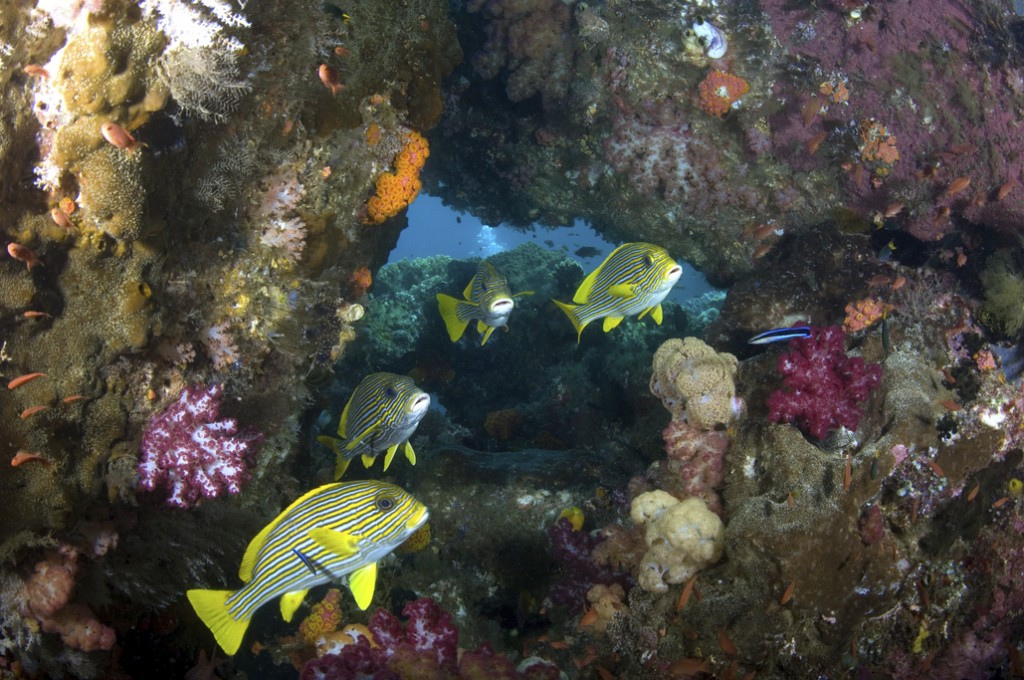- Indonesia’s crackdown on illegal, unreported and unregulated fishing in its waters is paying off for domestic fisheries and fish recovery, according to a new study.
- But for Indonesia to continue to reap the benefits from its anti-IUU fishing policies, the country needs to ensure that domestic fishing efforts are also well-managed, the paper’s authors noted.
- Indonesia’s success in tackling illegal fishing provides an example that can be implemented in other countries plagued by overfishing by foreign vessels, the researchers concluded.
JAKARTA — Tough measures by Indonesia to protect its fisheries from foreign poaching vessels are proving effective in helping replenish fish stocks, a new study says.
Seizing and blowing up illegal foreign fishing boats and banning fish transfers at sea have eased the pressure on Indonesia’s intensively fished waters. The country, the second-biggest marine capture fisheries producer in the world, can serve as an example for other nations plagued by illegal fishing, according to the report published last month in the journal Nature Ecology & Evolution.
The report showed that foreign fishing activity in Indonesia declined by more than 90 percent, and total fishing by 25 percent, since 2014, when the government banned foreign fishing boats from its waters, among other restrictions on fishing.
Indonesia lost an estimated $4 billion per year to illegal fishing before 2014, the study noted. Since then, more than 300 ships, foreign and local alike, found violating the fishing bans have been seized and sunk.
“Indonesia’s anti-IUU [illegal, unreported and unregulated] fishing policies draw a lot of media attention and speculation about their effect, but no one has demonstrated or evaluated the efficacy of the policies,” said lead author Reniel Cabral, a postdoctoral marine scientist at the University of California, Santa Barbara.

Cabral and his colleagues studied three different empirical datasets: satellite data of nightlights; publicly accessible automatic identification system (AIS); and vessel monitoring system (VMS) data provided by the Indonesian government.
To verify whether Indonesia’s anti-IUU fishing efforts were helping fish recovery, the researchers focused on skipjack tuna, the largest fishery in Indonesia by volume, as a model case study.
The findings suggested Indonesian skipjack tuna fishermen would lose 59 percent in catch and 64 percent in profit by 2035 compared to current levels if an open-access regime was maintained and no IUU policies were implemented in the country.
On the other hand, the scientists suggested the fishermen could enjoy an increase of 14 percent in fish catch by 2035 and 12 percent rise in profit compared to current levels if the government continued to curtail IUU fishing and cap harvests at maximum sustainable levels.
Duto Nugroho, a fisheries biologist at Indonesia’s fisheries ministry, said the government had drawn up a number of frameworks and guidelines to achieve maximum sustainable levels to accommodate local fishermen. One such policy is the country’s 2016 fisher protection and empowerment act, which adopts sustainable criteria.
Nugroho said the ministry had carried out an evaluation of the policies, but noted there were indications that even as poaching by foreign vessels was severely diminished, local fishermen were catching more fish.
“There are still uncertainties on recovery status of fish stocks post anti-IUU [fishing] polices,” he said.
Domestic fishing appears to be expanding significantly to replace international fishing pressure and could undo the benefits of fighting illegal fishing if left unchecked, Cabral and his colleagues agreed.
“[F]or them to continually capture benefits from their anti-IUU fishing policies, they need to ensure that domestic fishing efforts are also well-managed,” Cabral said.
There are currently more than 3,300 new fishing boats under construction in Indonesia, and the government aims to distribute more than 13,800 sets of fishing gear to local fishermen by 2019. The new vessels are set to be much smaller than the foreign boats being replaced.
Reducing fishing pressure in Indonesia’s waters will have to mean imposing restrictions on local small-scale fishermen, for which contingencies must be made, the researchers noted.
“Governments should include pro-poor measures that provide an economic safety net to local fishers and make legal forms of fishing more lucrative and attractive,” they wrote.
Some of the measures the researchers suggested include making small-scale fisheries open access, banning trawl-like fishing gear, and improving fishery registration and data management.
The Indonesian government’s policy to make its VMS data publicly available is another indication of its commitment to combating domestic IUU fishing, they added.
“Increased transparency, along with effective regulation and enforcement, can lead to better outcomes for fish stocks and local livelihoods,” said David Kroodsma, director of research and development at Global Fishing Watch, an online platform by Google in partnership with the NGOs Oceana and SkyTruth.

About 20 percent of the global fish catch, amounting to 11 million to 26 million metric tons, is caught illegally, resulting in an annual global fisheries losses of $10 billion to $23.5 billion. In some regions, such as the western and central Pacific Ocean and eastern central Atlantic, illegally caught fish may constitute more than 30 percent of the total catch.
Rampant fishing activities in international waters or other countries’ exclusive economic zone has typically been accompanied by high incidences of IUU fishing activities, raising concerns about the sustainability of global fisheries.
The researchers suggest that what Indonesia has successfully achieved can be implemented in other countries struggling with interlopers in their waters.
“When a country is plagued by high levels of IUU fishing by foreign fleets, addressing IUU fishing can drive fisheries recovery without reducing local catch and profit,” Cabral wrote.
Banner image: Indonesia’s fisheries ministry has been seizing illegal foreign fishing vessels and blowing them up at sea. Image courtesy of the Indonesian fisheries ministry.
FEEDBACK: Use this form to send a message to the author of this post. If you want to post a public comment, you can do that at the bottom of the page.
